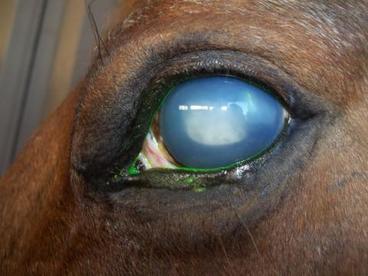The influence of multiple genetic risk factors for chronic uveitis in Appaloosas

Equine recurrent uveitis (ERU) is the leading cause of equine blindness, resulting from chronic and painful episodes of inflammation in the uveal tract of the eye. A definitive inciting cause for uveitis has not yet been determined; however, the inflammation is widely thought to be due to an immune-mediated reaction in genetically susceptible animals. Inflammation has been detected in the clinically normal eyes of chronically affected horses, suggesting that intraocular tissues are being destroyed even without overt signs of disease. Although uveitis occurs in all horse breeds, Appaloosa horses are eight times more likely to develop uveitis, frequently have a persistent form of the disease, and are nearly four times more likely to develop blindness than other breeds.
There is no cure for chronic uveitis in Appaloosa horses. Horses diagnosed with this disease are typically managed with topical anti-inflammatory drugs during acute flare-ups of disease. Recent work has demonstrated that placing a surgical implant containing the immunosuppressive drug cyclosporine directly into affected eyes can drastically improve disease in horses affected by uveitis and decrease the likelihood of developing blindness. If horses at high risk for developing uveitis could be identified prior to the onset of clinical disease, they could be monitored with frequent ophthalmologic examinations, and aggressive sight-sparing treatment options, such as cyclosporine implants, could be initiated at the first sign of inflammation.
We are evaluating two regions of the horse genome for functional genetic variants associated with chronic uveitis in Appaloosas. The goal of our research is to identify the functional genetic factors responsible for uveitis susceptibility in Appaloosa horses and to develop a genetic risk model for this disease. The genetic risk model will facilitate the generation of a genetic test so that individuals at high risk of developing uveitis can be identified and treatment initiated before the devastating clinical disease occurs. In addition to developing a genetic test, the information gained from this work will lead to an improved understanding of the biology of uveitis and better treatment options.
Publications
Fritz, K. L., Kaese, H. J., Valberg, S. J., Hendrickson, J. A., Rendahl, A. K., Bellone, R. R., Dynes, K. M., Wagner, M. L., Lucio, M. A., Cuomo, F. M., Brinkmeyer-Langford, C. L., Skow, L. C., Mickelson, J. R., Rutherford, M. S. and McCue, M. E. (2014), Genetic risk factors for insidious equine recurrent uveitis in Appaloosa horses. Animal Genetics, 45: 392–399. doi: 10.1111/age.12129
Sources of Research Funding
- Morris Animal Foundation
- Bernice Barbour Foundation
- US Equestrian Foundation
- University of Minnesota Equine Center and College of Veterinary Medicine
- Minnesota Racing Commission
- Minnesota Agricultural Experiment Station
- Private Donors